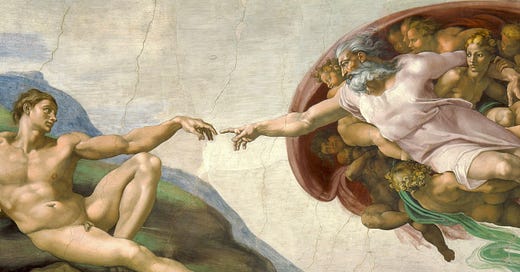**This post is for paid-subscribers only. If you would like to read the full content and all future paid-content, consider becoming a paid subscriber and support my work!**
This Sunday, the Church presents us with the “Blessings and Curses” in St. Luke’s Gospel.
These statements are similar to the Beatitudes in Matthew’s Gospel. However, according to Scholars, as we see in the footnote of the Great Adventure Bible from Ascension, these texts differ most likely because of the source materials the Evangelists had at their disposal.
This is what we hear from St. Luke:
Jesus came down with the Twelve and stood on a stretch of level ground
with a great crowd of his disciples and a large number of the people
from all Judea and Jerusalem and the coastal region of Tyre and Sidon.
And raising his eyes toward his disciples he said:
“Blessed are you who are poor, for the kingdom of God is yours.
Blessed are you who are now hungry, for you will be satisfied.
Blessed are you who are now weeping, for you will laugh.
Blessed are you when people hate you, and when they exclude and insult you,
and denounce your name as evil on account of the Son of Man.
Rejoice and leap for joy on that day! Behold, your reward will be great in heaven.
For their ancestors treated the prophets in the same way.
But woe to you who are rich, for you have received your consolation.
Woe to you who are filled now, for you will be hungry.
Woe to you who laugh now, for you will grieve and weep.
Woe to you when all speak well of you, for their ancestors treated the false prophets in this way.”
In these stark words of Our Lord, we are presented with two realities: the present reality and the consequences of our choices.
This paradox—present suffering for future reward and relative comfort now for future suffering—can be difficult to grasp.
Why would God allow suffering now for future reward in Heaven? How can comfort now lead to future damnation?
These questions and this paradox leads one to reflect on God’s will. Or, more precisely, God’s “permissive will” versus His “active will.”
In light of this Gospel, which calls for us to accept the suffering we receive and unite it to the Cross of Our Lord in exchange for future blessedness in Heaven, I would like for us to reflect on God’s Providence.
Below, we will reflect on God’s Will:
His Active Will
His Passive Will
The importance of this distinction as an answer to suffering
The Sunday Gospel Theology Companion
Does God actively will people to suffer? Does God, the supposed all-loving, all-knowing, and all-compassionate God, look kindly on the wide-scale suffering of mankind with delight?
These are essential question we must answer in light; not only of sin and suffering, but especially in light of our Gospel in which Jesus emphatically states that those who suffer now will be rewarded in Heaven.
God’s Will
To begin, let us first answer the question of God’s Will. Namely: Does God will?
St. Thomas Aquinas states that “in every intellectual being there is will… And so there must be will in God, since there is intellect in Him. And as His intellect is His own existence, so is His will.”1 Since God’s intellect is equal to His existence (for Aquinas, God is simple: God’s essence is His existence), God therefore has an intellect. Since He has an intellect, He has a will. Furthermore, St. Thomas states in the next article that God “wills both Himself to be, and other things to be; but Himself as the end, and other things as ordained to that end; inasmuch as it befits the divine goodness that other things should be partakers therein.”2 Here, St. Thomas is broadening his answer to the former question which we referenced above: God not only wills Himself to be, but He also wills other things to be as well.
Since we have now established that God does will—not only in himself, but in creation as well, we can move to our broader questions: what does God will, and what is the distinction between the “active” and “passive” will?
God’s Active Will
God wills all into existence, and in the order of creation, God’s providence guides all things.
In Sacred Scripture, time and again, we see evidence of this truth. Psalm 115 states emphatically that “Our God is in the heavens; he does whatever he pleases.”3 Likewise, the book of Proverbs states that “Many are the plans in the mind of a man, but it is the purpose of the Lord that will be established.”4 Then, Our Lord speaking about the care of the Father states in the Gospel that “Are not two sparrows sold for a penny? And not one of them will fall to the ground without your Father’s will.”5 Lastly, St. Paul writes that God “has made known to us in all wisdom and insight the mystery of his will, according to his purpose which he set forth in Christ… In him, according to the purpose of him who accomplishes all things according to the counsel of his will”.6
Keep reading with a 7-day free trial
Subscribe to In Defense of Theology to keep reading this post and get 7 days of free access to the full post archives.





